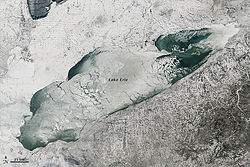Lake Erie
| Lake Erie | |
|---|---|

Lake Erie on January 9, 2014
|
|

The Great Lakes, with Lake Erie highlighted in darker blue
|
|
| Location | North America |
| Group | Great Lakes |
| Coordinates | 42°12′N 81°12′W / 42.2°N 81.2°WCoordinates: 42°12′N 81°12′W / 42.2°N 81.2°W |
| Lake type | Glacial |
| Primary inflows | Detroit River |
| Primary outflows |
Niagara River Welland Canal |
| Basin countries | Canada United States |
| Max. length | 241 mi (388 km) |
| Max. width | 57 mi (92 km) |
| Surface area | 9,910 sq mi (25,667 km2) |
| Average depth | 62 ft (19 m) |
| Max. depth | 210 ft (64 m) |
| Water volume | 116 cu mi (480 km3) |
| Residence time | 2.6 years |
| Shore length1 | 799 mi (1,286 km) plus 72 mi (116 km) for islands |
| Surface elevation | 569 ft (173 m) |
| Islands | 24+ (see list) |
| Settlements |
Buffalo, New York Erie, Pennsylvania Toledo, Ohio Cleveland, Ohio |
| References | |
| 1 Shore length is not a well-defined measure. | |
Lake Erie (/ˈɪəri/; French: Lac Érié) is the fourth-largest lake (by surface area) of the five Great Lakes in North America, and the thirteenth-largest globally if measured in terms of surface area. It is the southernmost, shallowest, and smallest by volume of the Great Lakes and therefore also has the shortest average water residence time. At its deepest point Lake Erie is 210 feet (64 metres) deep. Lake Erie's northern shore is bounded by the Canadian province of Ontario, with the U.S. states of Ohio, Pennsylvania, and New York on its southern and easternmost shores and Michigan on the west. These jurisdictions divide the surface area of the lake by water boundaries. The lake was named by the Erie people, a Native Americans people who lived along its southern shore. That Iroquoian tribe called it "Erige" ("cat") because of its unpredictable and sometimes violently dangerous nature. It is a matter of conjecture whether the lake was named after the tribe, or if the tribe was called "Erie" because of its proximity to the lake.
Situated below Lake Huron, Erie's primary inlet is the Detroit River. The main natural outflow from the lake is via the Niagara River, which provides hydroelectric power to Canada and the U.S. as it spins huge turbines near Niagara Falls at Lewiston, New York and Queenston, Ontario. Some outflow occurs via the Welland Canal which diverts water for ship passages from Port Colborne, Ontario on Lake Erie, to St. Catharines on Lake Ontario, an elevation difference of 326 ft (99 m). Lake Erie's environmental health has been an ongoing concern for decades, with issues such as overfishing, pollution, algae blooms and eutrophication generating headlines.
...
Wikipedia
